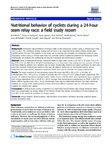Nutritional behavior of cyclists during a 24-hour team relay race: a field study report
| dc.contributor.author | Bescós, R | |
| dc.contributor.author | Rodríguez, FA | |
| dc.contributor.author | Iglesias, X | |
| dc.contributor.author | Knechtle, B | |
| dc.contributor.author | Benítez, A | |
| dc.contributor.author | Marina, M | |
| dc.contributor.author | Padullés, JM | |
| dc.contributor.author | Torrado, P | |
| dc.contributor.author | Vazquez, J | |
| dc.contributor.author | Rosemann, T | |
| dc.date.accessioned | 2019-03-28T23:02:13Z | |
| dc.date.available | 2019-03-28T23:02:13Z | |
| dc.date.issued | 2012-02-06 | |
| dc.identifier.issn | 1550-2783 | |
| dc.identifier.issn | 1550-2783 | |
| dc.identifier.other | ARTN 3 | |
| dc.identifier.uri | http://hdl.handle.net/10026.1/13577 | |
| dc.description.abstract |
BACKGROUND: Information about behavior of energy intake in ultra-endurance cyclists during a 24-hour team relay race is scarce. The nutritional strategy during such an event is an important factor which athletes should plan carefully before the race. The purpose of this study was to examine and compare the nutritional intake of ultra-endurance cyclists during a 24-hour team relay race with the current nutritional guidelines for endurance events. Additionally, we analyzed the relationship among the nutritional and performance variables. METHODS: Using a observational design, nutritional intake of eight males (mean ± SD: 36.7 ± 4.7 years; 71.6 ± 4.9 kg; 174.6 ± 7.3 cm; BMI 23.5 ± 0.5 kg/m2) participating in a 24-hour team relay cycling race was assessed. All food and fluid intake by athletes were weighed and recorded. Additionally, distance and speed performed by each rider were also recorded. Furthermore, before to the race, all subjects carried out an incremental exercise test to determine two heart rate-VO2 regression equations which were used to estimate the energy expenditure. RESULTS: The mean ingestion of macronutrients during the event was 943 ± 245 g (13.1 ± 4.0 g/kg) of carbohydrates, 174 ± 146 g (2.4 ± 1.9 g/kg) of proteins and 107 ± 56 g (1.5 ± 0.7 g/kg) of lipids, respectively. This amount of nutrients reported an average nutrient intake of 22.8 ± 8.9 MJ which were significantly lower compared with energy expenditure 42.9 ± 6.8 MJ (P = 0.012). Average fluid consumption corresponded to 10497 ± 2654 mL. Mean caffeine ingestion was 142 ± 76 mg. Additionally, there was no relationship between the main nutritional variables (i.e. energy intake, carbohydrates, proteins, fluids and caffeine ingestion) and the main performance variables (i.e. distance and speed). CONCLUSIONS: A 24-hour hours cycling competition in a team relay format elicited high energy demands which were not compensated by energy intake of the athletes despite that dietary consumption of macronutrients did not differ to the nutritional guidelines for longer events. | |
| dc.format.extent | 3- | |
| dc.format.medium | Electronic | |
| dc.language | en | |
| dc.language.iso | eng | |
| dc.publisher | Informa UK Limited | |
| dc.subject | energy balance | |
| dc.subject | ultra-endurance | |
| dc.subject | macronutrient consumption | |
| dc.subject | hydration | |
| dc.subject | bicycling | |
| dc.subject | weighed dietary record | |
| dc.subject | descriptive study | |
| dc.title | Nutritional behavior of cyclists during a 24-hour team relay race: a field study report | |
| dc.type | journal-article | |
| dc.type | Journal Article | |
| plymouth.author-url | https://www.webofscience.com/api/gateway?GWVersion=2&SrcApp=PARTNER_APP&SrcAuth=LinksAMR&KeyUT=WOS:000300953300001&DestLinkType=FullRecord&DestApp=ALL_WOS&UsrCustomerID=11bb513d99f797142bcfeffcc58ea008 | |
| plymouth.issue | 1 | |
| plymouth.volume | 9 | |
| plymouth.publication-status | Published | |
| plymouth.journal | Journal of the International Society of Sports Nutrition | |
| dc.identifier.doi | 10.1186/1550-2783-9-3 | |
| plymouth.organisational-group | /Plymouth | |
| plymouth.organisational-group | /Plymouth/Faculty of Health | |
| plymouth.organisational-group | /Plymouth/Faculty of Health/School of Health Professions | |
| plymouth.organisational-group | /Plymouth/REF 2021 Researchers by UoA | |
| plymouth.organisational-group | /Plymouth/REF 2021 Researchers by UoA/UoA03 Allied Health Professions, Dentistry, Nursing and Pharmacy | |
| plymouth.organisational-group | /Plymouth/Research Groups | |
| plymouth.organisational-group | /Plymouth/Research Groups/Institute of Health and Community | |
| plymouth.organisational-group | /Plymouth/Research Groups/Plymouth Institute of Health and Care Research (PIHR) | |
| plymouth.organisational-group | /Plymouth/Users by role | |
| plymouth.organisational-group | /Plymouth/Users by role/Academics | |
| dc.publisher.place | United States | |
| dcterms.dateAccepted | 2012-02-06 | |
| dc.identifier.eissn | 1550-2783 | |
| dc.rights.embargoperiod | Not known | |
| rioxxterms.versionofrecord | 10.1186/1550-2783-9-3 | |
| rioxxterms.licenseref.uri | http://www.rioxx.net/licenses/all-rights-reserved | |
| rioxxterms.licenseref.startdate | 2012-02-06 | |
| rioxxterms.type | Journal Article/Review |


